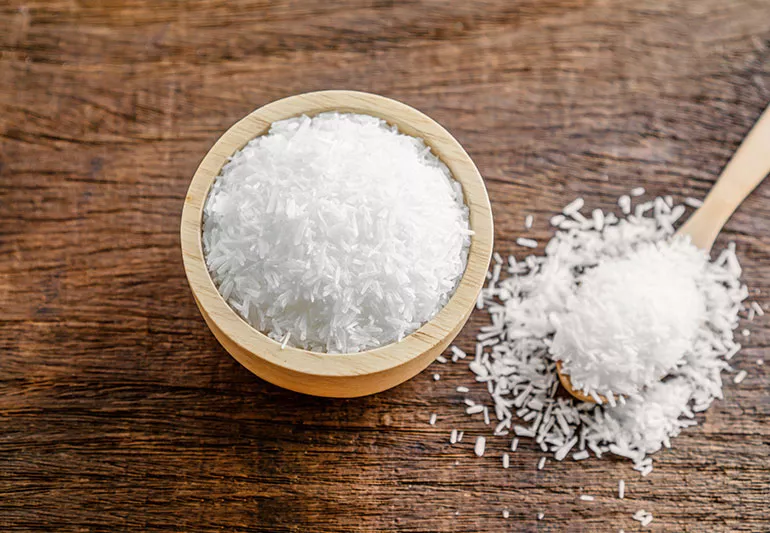Is MSG Actually Bad for You?

Monosodium glutamate, commonly known as MSG, is a substance that has sparked much debate in the world of nutrition over the years. From its origins to its controversial reputation, understanding MSG is essential for making informed dietary choices.
The main question is – is MSG actually bad for you? Let’s dive in!
What is MSG?
MSG is the sodium salt of glutamic acid, a naturally occurring amino acid found in many foods, such as tomatoes, cheese, mushrooms, and soy sauce.
Chemically, it consists of water, sodium, and glutamate, the latter being responsible for its flavour-enhancing properties.
How is MSG Used?
MSG is used as an additive. It is a flavour enhancer in various cuisines, particularly in Asian cooking. It brings out the umami taste, one of the five basic tastes alongside sweet, salty, bitter, and sour. It is commonly added to processed foods like soups, snacks, canned vegetables, and frozen meals.
Why is MSG Used?
MSG improves the flavour profile of dishes without adding extra calories or sodium. It is an economical way for food manufacturers to enhance taste. It is used globally in restaurants and processed foods due to its effectiveness and affordability.
Where does its bad rep come from?
MSG’s poor reputation originated from anecdotal reports in the late 1960s suggesting it caused symptoms like headaches and palpitations. These claims, widely publicised by the media, created lasting negative associations. Early scientific studies that investigated these reports often used unrealistically high doses of MSG, occasionally finding adverse effects and further fueling public concern.
The media played a significant role in perpetuating MSG’s negative image, often emphasising sensationalist anecdotes over scientific evidence. Food labelling practices also contributed, with many products proudly advertising “No MSG” to appeal to concerned consumers, reinforcing the perception that MSG is something to be avoided.
What does the research say?
Over the years, MSG has been linked to various health concerns:
- Headaches and Migraines: Some individuals report headaches after consuming MSG, but studies have not consistently shown a causal relationship.
- Asthma: Claims suggest MSG can trigger asthma attacks, yet most studies found no significant correlation.
- Obesity and Metabolic Syndrome: Some observational studies link high MSG consumption to weight gain, but they do not establish a direct cause-and-effect relationship.
- Allergic Reactions and Sensitivities: Symptoms like sweating or chest pain have been reported after consuming MSG, though these reactions are rare and often not consistently reproducible.
- Neurotoxicity Concerns: Early animal studies suggested potential neurotoxic effects, but human studies have not found evidence of neurotoxicity at normal consumption levels.
Overall, extensive research, including studies by the FDA and other health organisations, has not conclusively proven that MSG causes serious health problems in moderate amounts.
The U.S. Food and Drug Administration considers MSG to be “generally recognised as safe” (GRAS) when consumed at customary levels.
The European Food Safety Authority also regards MSG as safe, with no definitive links to severe health issues.
Should We Fear MSG?
As with many areas of nutrition, moderation is key. As a result, the bad rep MSG has obtained over the years may be unfair!
Like any additive, if consumed, MSG should be consumed in moderation. Excessive intake of any substance, including salt or sugar, can be harmful in the long-run. Some foods that contain MSG aren’t great for you, like ultra-processed and fast foods. So, limiting your intake of those might be a good idea, regardless of whether you trust MSG or not.
Some people may be sensitive to MSG and experience mild symptoms like headaches or nausea, but such reactions are generally rare and not indicative of widespread harm. Focusing on a balanced diet with whole foods and minimally processed items is the best approach to nutrition.
Monosodium glutamate has been the subject of much debate and misinformation over the years. However, current research indicates that MSG, when consumed in typical amounts, is safe for the majority of people.
Fresh Fitness Food provides personalised meal plans delivered straight to your door, ensuring not only that you have the nutrients you need to keep you energised, but also that you have the time usually spent shopping, cooking and washing up, to engage in your favourite activities. Order today and start smashing your goals with personalised nutrition!
Want to discuss which nutrition plan is right for you first? Book a call with our in-house nutrition team here.
Get £50 off a 5-day trial with code: BLOG50. Start your trial here!
- The Comfort of Tradition: Why We Crave Holiday Foods - December 23, 2024
- Is There a Place for Ultra-Processed Foods in Your Diet? - November 29, 2024
- Tempeh and Quinoa Power Bowl Recipe - November 7, 2024